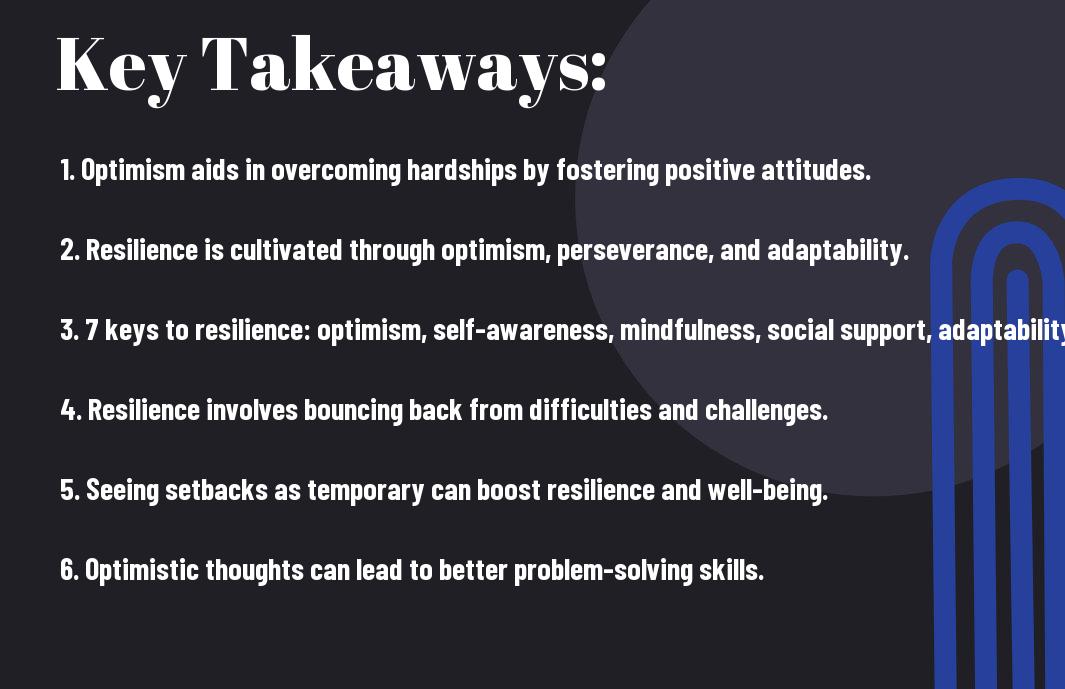Adversity is an inevitable part of life, but how we navigate through it can make all the difference. In challenging times, cultivating optimism can be a powerful tool in overcoming obstacles. Research shows that individuals with a positive outlook are better equipped to bounce back from setbacks and persevere in the face of adversity. Along with optimism, there are seven key factors that contribute to resilience. These include self-awareness, adaptability, social support, problem-solving skills, a sense of purpose, emotional regulation, and physical well-being. By understanding and honing these key aspects of resilience, individuals can better navigate through life’s challenges and emerge stronger on the other side.

Key Takeaways:
- Optimism can help in overcoming adversity: Having a positive outlook can provide strength and motivation when facing challenges.
- Resilience is important in navigating through tough times: Building resilience can help individuals bounce back from setbacks and thrive despite adversity.
- The 7 keys to resilience are:
- Embrace change and stay flexible
- Develop a strong support system
- Take care of your physical and mental health
- Set goals and work towards them
- Practice self-compassion and self-care
- Maintain a hopeful outlook
- Learn from past experiences and stay adaptable
- Each key to resilience plays a crucial role: Combining these elements can help individuals better cope with adversity and improve their overall well-being.
- Being resilient is a skill that can be developed: By practicing these 7 keys to resilience, individuals can strengthen their ability to overcome challenges and setbacks.

Defining Resilience in the Face of Challenges
The Psychological Foundations of Resilience
Face any challenge with resilience involves a complex interplay of psychological factors. Resilience is not just about bouncing back from adversity; it also involves the ability to adapt positively in the face of stress, trauma, or other negative experiences. Individuals who demonstrate resilience often exhibit traits such as optimism, self-efficacy, flexibility, and strong problem-solving skills.
Measuring Resilience
One way to measure resilience is through various psychological assessments that gauge an individual’s ability to cope with stress and overcome adversity. These assessments often focus on factors such as emotional intelligence, social support, coping strategies, and mindset. By understanding a person’s level of resilience, practitioners can tailor interventions to enhance their ability to navigate through challenging situations.
For instance, the Connor-Davidson Resilience Scale (CD-RISC) is a widely used tool that measures resilience by assessing aspects such as the ability to adapt to change, maintain perspective under pressure, and bounce back from setbacks. This scale provides valuable insights into an individual’s resilience levels and can guide professionals in developing targeted interventions to build resilience in their clients or patients.
The 7 Keys to Resilience
Optimism and Positive Thinking
To overcome adversity, optimism and positive thinking play a crucial role. With a positive outlook, individuals can better navigate challenges and setbacks, finding the silver lining in difficult situations.
Building a Supportive Network
Any resilient individual knows the importance of building a supportive network. Surrounding yourself with friends, family, or mentors who provide encouragement, advice, and a listening ear can help you weather the storms of life.
Thinking of your support system as a safety net can give you the confidence to take risks and face challenges head-on, knowing that you have a team of people cheering you on.
Embracing Change as an Opportunity
The ability to embrace change as an opportunity for growth is a key component of resilience. The mindset that change can lead to new experiences, lessons, and possibilities can empower individuals to adapt and thrive in the face of adversity.
The willingness to see change as a chance to learn, evolve, and discover new paths can make a significant difference in how one navigates through life’s ups and downs.
Cultivating Emotional Intelligence
Embracing emotional intelligence involves recognizing and managing one’s own emotions effectively. Understanding how emotions impact thoughts and behaviors can help individuals regulate their responses to challenging situations and cultivate resilience.
Plus, emotionally intelligent individuals can better navigate interpersonal relationships, communicate effectively, and handle stress in a healthy manner.
Developing Problem-Solving Skills
On the journey to resilience, developing problem-solving skills is imperative. Individuals who can approach problems with a sense of curiosity, creativity, and optimism are better equipped to find solutions and overcome obstacles effectively.
Opportunity to practice problem-solving skills can arise from adversity, providing individuals with the chance to hone their abilities and increase their resilience in the process.
Establishing Goals and Finding Purpose
Any resilient individual understands the importance of establishing goals and finding purpose in life. Setting clear objectives and aligning actions with personal values can provide a sense of direction, motivation, and resilience in the face of adversity.
Keys to persevering through challenging times can often be found in the pursuit of meaningful goals and the fulfillment that comes from living a purpose-driven life.
Self-Care and Stress Management Techniques
Cultivating self-care practices and stress management techniques is imperative for maintaining resilience. It involves prioritizing physical and mental well-being, setting boundaries, practicing mindfulness, and seeking support when needed.
It is important to remember that taking care of oneself is not selfish but rather a necessary component of building and sustaining resilience in the face of adversity.
Optimism and Its Limits
The Benefits of a Positive Outlook
Benefits of having a positive outlook include improved mental and physical health, better relationships, and increased resilience in the face of challenges. Optimism has been linked to lower levels of stress, reduced risk of depression, and even enhanced longevity. When individuals maintain a positive perspective, they are more likely to persevere through hardships and view setbacks as temporary obstacles rather than insurmountable barriers.
Potential Pitfalls of Excessive Optimism
Limits to optimism arise when individuals overlook potential risks and fail to adequately prepare for setbacks. While a positive outlook is generally beneficial, excessive optimism can lead to complacency and a lack of realistic assessment of situations. It is important to balance optimism with a realistic understanding of the challenges ahead to avoid being blindsided by unexpected obstacles.
Another important consideration is that excessive optimism can sometimes result in individuals dismissing valid concerns or failing to take necessary precautions. While maintaining a hopeful attitude is crucial for resilience, it is equally important to acknowledge the potential pitfalls and complexities of a situation to effectively navigate adversity.
Strategies for Cultivating Optimism
Mindset and Attitude Adjustments
Despite facing challenges, cultivating optimism is possible through mindset and attitude adjustments. By shifting our perspective towards focusing on the positives rather than dwelling on the negatives, we can train our minds to see setbacks as opportunities for growth and learning.
Practical Exercises to Enhance Optimism
Enhance your optimistic outlook through practical exercises that foster a positive mindset. Practice gratitude by keeping a daily journal of things you are thankful for, engage in positive self-talk to boost your confidence, and challenge negative thoughts by replacing them with more optimistic ones. These exercises can help rewire your brain to default to a more optimistic viewpoint.
Another effective exercise to enhance optimism is visualization. Spend a few minutes each day visualizing a successful outcome to a challenging situation. By envisioning a positive resolution, you are training your brain to focus on possibilities and solutions, rather than getting stuck in a cycle of negativity.
Final Words
From above discussion, it is evident that optimism plays a crucial role in overcoming adversity. The 7 keys to resilience – self-awareness, self-regulation, optimism, mental agility, strength of character, connection, and reaching out – provide a comprehensive framework for building resilience in the face of challenges. By cultivating these characteristics, individuals can navigate through difficulties and emerge stronger on the other side. Recall, resilience is not about avoiding adversity, but about facing it head-on with a positive mindset. With the right attitude and tools, anyone can bounce back from setbacks and thrive in the face of adversity.
FAQ
Q: Is optimism the key to overcoming adversity?
A: Yes, optimism plays a significant role in overcoming adversity. Having a positive outlook can help individuals navigate through tough times and find solutions to challenges.
Q: What are the 7 keys to resilience?
A: The 7 keys to resilience are:
1. Positive outlook
2. Emotional awareness
3. Active coping skills
4. Strong support system
5. Problem-solving skills
6. Flexibility
7. Meaning and purpose
Q: How does a positive outlook contribute to resilience?
A: A positive outlook can help individuals see challenges as opportunities for growth, maintain hope during difficult times, and bounce back stronger from setbacks.
Q: Why is emotional awareness important for resilience?
A: Emotional awareness allows individuals to understand their feelings, manage stress effectively, and seek help when needed. It is a crucial aspect of building resilience.
Q: How can problem-solving skills help in overcoming adversity?
A: Developing strong problem-solving skills enables individuals to assess situations rationally, come up with effective solutions, and take proactive steps to address challenges, thus increasing resilience.